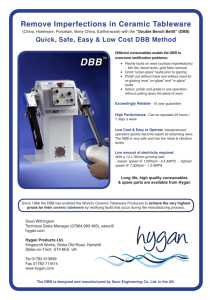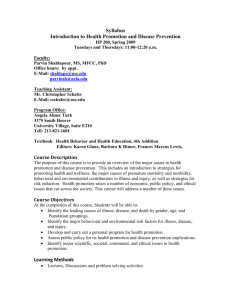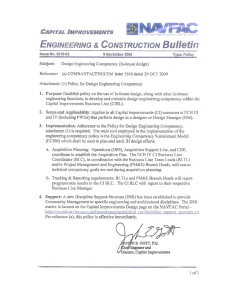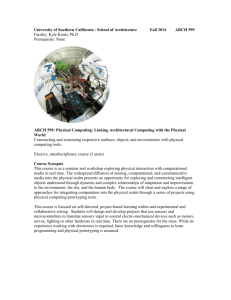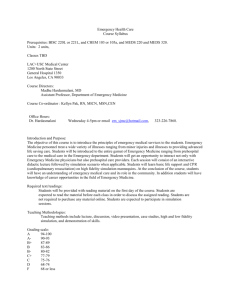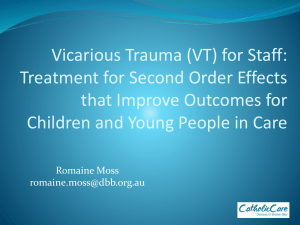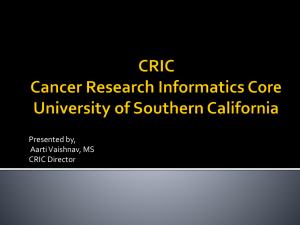meds-350_syllabus
advertisement
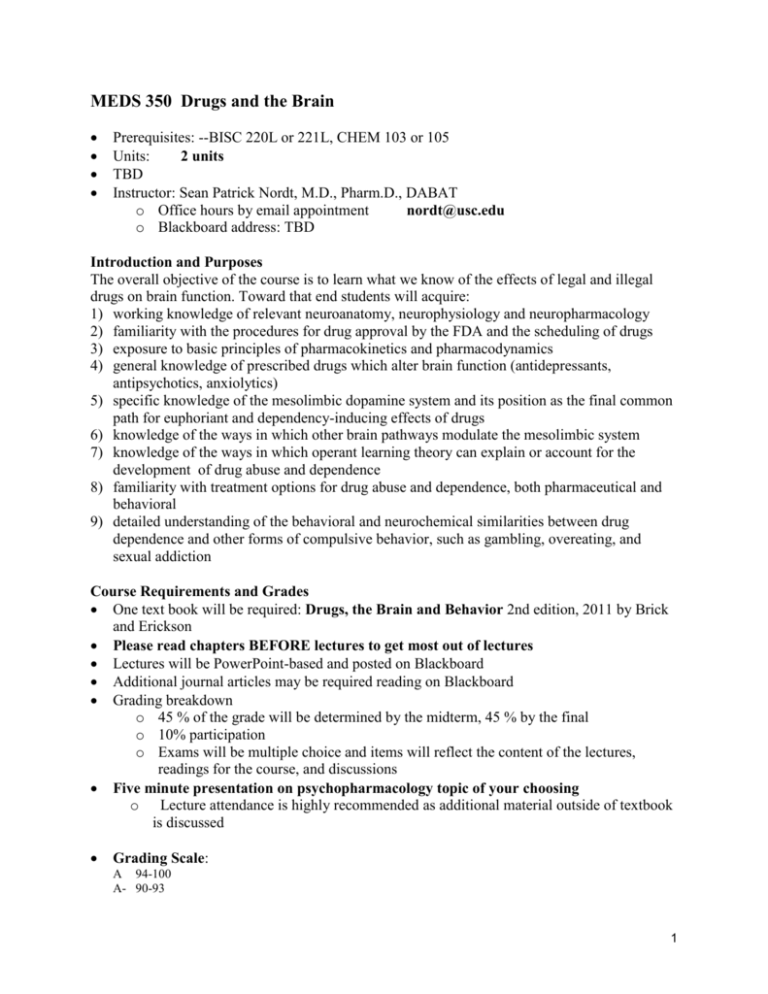
MEDS 350 Drugs and the Brain Prerequisites: --BISC 220L or 221L, CHEM 103 or 105 Units: 2 units TBD Instructor: Sean Patrick Nordt, M.D., Pharm.D., DABAT o Office hours by email appointment nordt@usc.edu o Blackboard address: TBD Introduction and Purposes The overall objective of the course is to learn what we know of the effects of legal and illegal drugs on brain function. Toward that end students will acquire: 1) working knowledge of relevant neuroanatomy, neurophysiology and neuropharmacology 2) familiarity with the procedures for drug approval by the FDA and the scheduling of drugs 3) exposure to basic principles of pharmacokinetics and pharmacodynamics 4) general knowledge of prescribed drugs which alter brain function (antidepressants, antipsychotics, anxiolytics) 5) specific knowledge of the mesolimbic dopamine system and its position as the final common path for euphoriant and dependency-inducing effects of drugs 6) knowledge of the ways in which other brain pathways modulate the mesolimbic system 7) knowledge of the ways in which operant learning theory can explain or account for the development of drug abuse and dependence 8) familiarity with treatment options for drug abuse and dependence, both pharmaceutical and behavioral 9) detailed understanding of the behavioral and neurochemical similarities between drug dependence and other forms of compulsive behavior, such as gambling, overeating, and sexual addiction Course Requirements and Grades One text book will be required: Drugs, the Brain and Behavior 2nd edition, 2011 by Brick and Erickson Please read chapters BEFORE lectures to get most out of lectures Lectures will be PowerPoint-based and posted on Blackboard Additional journal articles may be required reading on Blackboard Grading breakdown o 45 % of the grade will be determined by the midterm, 45 % by the final o 10% participation o Exams will be multiple choice and items will reflect the content of the lectures, readings for the course, and discussions Five minute presentation on psychopharmacology topic of your choosing o Lecture attendance is highly recommended as additional material outside of textbook is discussed Grading Scale: A 94-100 A- 90-93 1 B+ B BC+ C CD+ D DF 87-89 83-86 80-82 77-79 75-76 74-70 69-67 66-64 63-60 59-0 Course Sessions* NB: Dates of topics may change based upon lecturers Session Topic Reading Week 1 Drug development/Research/Scheduling of Drugs DBB, Ch. 1 Week 2 Neurophysiology DBB Ch. 2 and 5 Week 3 Neuroanatomy DBB Ch. 4 Week 4 Pharmacokinetics/Pharmacodynamics DBB Ch. 3. Week 5 Anxiety disorders DBB Ch. 10 Week 6 Major Depression DBB Ch. 11 Week 7 MIDTERM Week 8 Bipolar Depression DBB Ch. 11 Week 9 Schizophrenia DBB Ch. 12 Week 10 Addiction DBB Ch. 13 Week 11 Ethanol DBB Ch. 6 Week 12 Cocaine/Amphetamines DBB Ch. 7 Week 13 Marijuana DBB Ch. 9 Week 14 Opioids DBB Ch 13 Week 15 Review Session DBB Ch 13 2 FINAL – From Midterm On Statement for Students with Disabilities Any student requesting academic accommodations based on a disability is required to register with Disability Services and Programs (DSP) each semester. A letter of verification for approved accommodations can be obtained from DSP. Please be sure the letter is delivered to me (or to TA) as early in the semester as possible. DSP is located in STU 301 and is open 8:30 a.m.–5:00 p.m., Monday through Friday. The phone number for DSP is (213) 740-0776. Statement on Academic Integrity USC seeks to maintain an optimal learning environment. General principles of academic honesty include the concept of respect for the intellectual property of others, the expectation that individual work will be submitted unless otherwise allowed by an instructor, and the obligations both to protect one’s own academic work from misuse by others as well as to avoid using another’s work as one’s own. All students are expected to understand and abide by these principles. Scampus, the Student Guidebook, contains the Student Conduct Code in Section 11.00, while the recommended sanctions are located in Appendix A: http://www.usc.edu/dept/publications/SCAMPUS/gov/. Students will be referred to the Office of Student Judicial Affairs and Community Standards for further review, should there be any suspicion of academic dishonesty. The Review process can be found at: http://www.usc.edu/student-affairs/SJACS/. Emergency Preparedness/Course Continuity: In case of emergency, and travel to campus is difficult, USC executive leadership will announce an electronic way for instructors to teach students in their residence halls or homes using a combination of Blackboard, teleconferencing, and other technologies. Instructors should be prepared to assign students a "Plan B" project that can be completed at a distance. For additional information about maintaining your classes in an emergency please access: http://cst.usc.edu/services/emergencyprep.html 3
